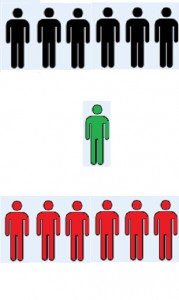Wisdom is our most important practical quality, but it often seems to be more the basis of fantasy than cultivation. Given an educational system that will barely mention it, it is hardly surprising if wisdom to many people primarily means wizards with long beards and flowing robes. If we have not even reflected how far we have it ourselves, it’s not surprising if it’s projected onto distant figures. But wisdom is about how you make judgements: about, say, what to eat for lunch, or how to respond to that irritating colleague, or whether to spend the evening reading or browsing the internet. We all have it to some extent, and we lack it in other respects.
Wisdom should not be confused with knowledge. It is not about what you know, unless it’s about recognising how little you know (as Socrates famously said, he was only wise in the sense of recognising his ignorance). That means you could conceivably be quite wise with little education. Nor is wisdom an automatic benefit of age: you only have to reflect on the narrow-mindedness into which some older people sink to see that.
Instead, I want to suggest that wisdom is a quality dependent on how well we use the experience we have. If we only interpret experience in terms of narrow assumptions, that experience will be useless to us, and will not enable us to learn. Instead, experience will only re-confirm the assumptions we already carry. That’s the positive feedback loop we can get into if we are fixated on ‘knowledge’ or ‘truth’, believing that we have these things and then making our experience fit.
To become wiser, then, we will need to avoid these kinds of fixed beliefs, whether they are positive or negative, but investigate closely, even amongst sets of beliefs we otherwise reject, for ideas that are relevant and helpful. That means that, for example, the wise socialist will try to learn from conservatives even whilst rejecting dogmatic elements of conservatism (and vice-versa). Or if you have a strong belief in yourself as, say, destined to be a successful artist, but end up rejecting that belief as unrealistic, to cultivate wisdom in relation to that belief you will search around for aspects of that artistic aspiration that you can carry forward into other visions of your life.
Wisdom is often contrasted with compassion, but I want to suggest that the two are only conceptually distinguished: in practice they are inseparable. That’s because ‘reason’ is inseparable from ’emotion’, and it’s only a series of unhelpful cultural and philosophical habits that makes us often separate them too sharply. To be wise is to be compassionate, because whenever you challenge fixed beliefs about a person, you also challenge fixed feelings about them. By entering into more open beliefs about them, you also enter into more open emotional responses. By developing provisionality you also develop love, in a sense that avoids both hatred and possessiveness. Of course, the development of wisdom can only continue from wherever you start in emotional as well as cognitive terms, and someone who finds empathy difficult will not magically find it easy because of greater wisdom: but they will be more compassionate than they were before.
I’ve recently completed a video that explores the theme of wisdom in terms of the integration of belief. The integration of belief is simply a term for that process of sifting absolute beliefs from more helpful provisional ones – the process of developing wisdom and compassion. Here’s the video.
Picture by Ferdinand Reus (Wikimedia Commons) CCSA 3.0



